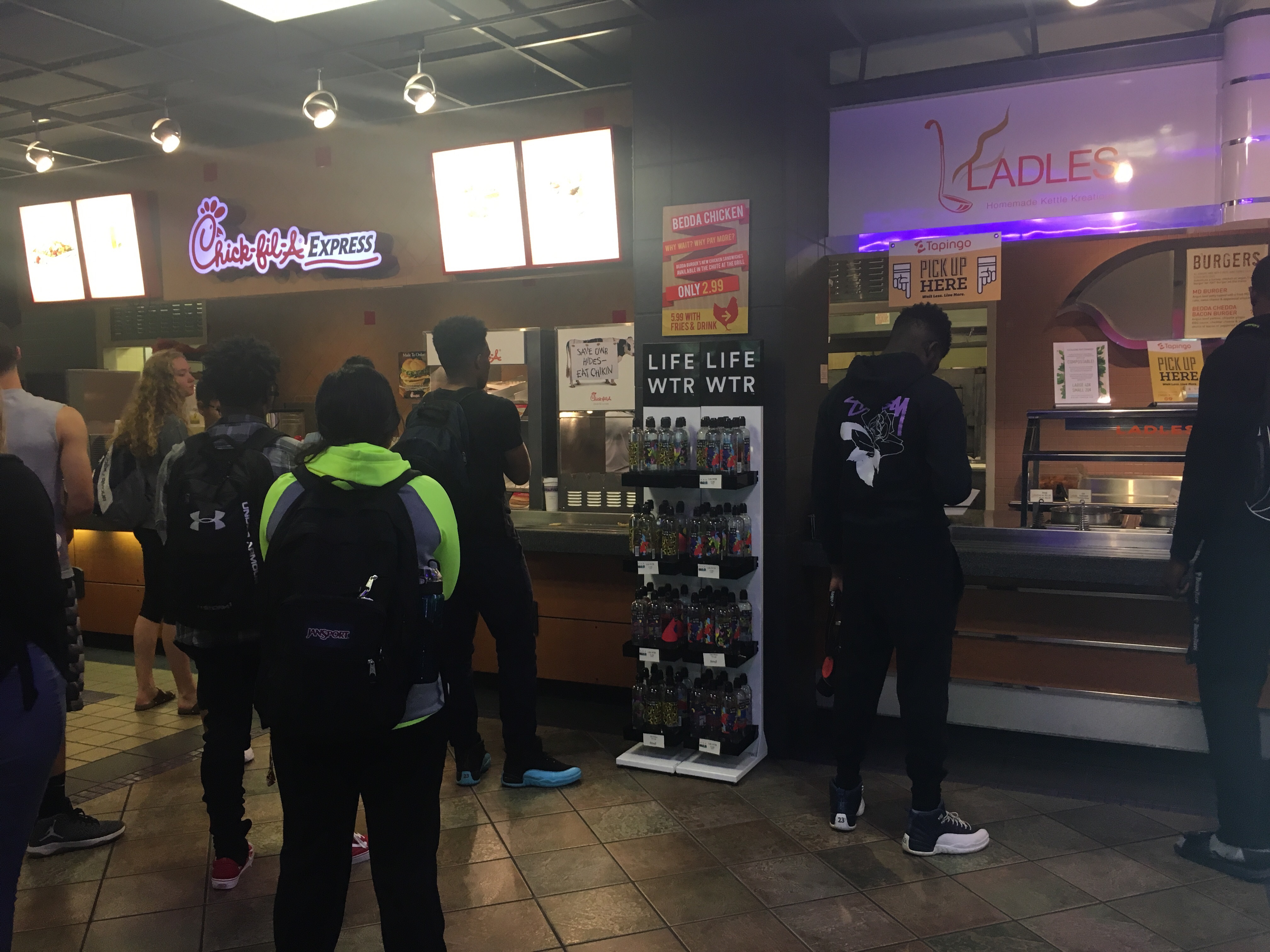
Students push for “real food” at TU
By: Kevin McGuire, Staff Writer
Photo by Bailey Hendricks/ The Towerlight
Out of the more than 20 dining options Towson students have on campus, only about two percent of the food served is “real food,” according to graduate assistant Kevin Barahona.
“Real food is classified as food that is good for the producer, the consumer, the community and the earth,” Barahona said.
Barahona and fellow “real food” advocate Brianna Patten lead the Real Food Challenge on campus. The Real Food Challenge is a nationwide, student-run organization that aims to shift $1 billion in campus food budgets to spend on local, sustainable food for students.
Barahona and Patten are working to convert 20 percent of Towson’s on-campus food to “real food” by 2020, in order to support local farms and workers in the Baltimore area who grow and sell food which benefits the four categories.
“Many large industrial farms use migrant labor, and they work under slave-like conditions,” said Barahona. “We want to make sure the workers and the farmers have good pay, working conditions and worker’s rights.”
If completed, Towson would be the first public college in Maryland to have 20 percent of its on campus food be designated with the “real food” category. Johns Hopkins University currently has 35 percent of its on-campus food designated with the category.
“I do believe in local food because when you get food that’s not local, a lot of the time they put preservatives in there to keep it fresh,” said sophomore Elisha Yaptangco. “Local food is better because you don’t have to worry about all of those preservatives. It can also help the local economy.”
Currently, Barahona and Patten are seeking to have their bill signed by Towson University President Kim Schatzel, in order to assess the food conditions on campus and how to bring “real food” to Towson.
“Schatzel said she would support the RFC if the student community was in favor of the shift,” Barahona said. “We got bills drafted and passed by the Student Council, the SGA and the Student Senate, but Schatzel still has not signed the bill.”
Schatzel said she supports providing students with healthy dining options, but that the University is still working out the logistics of such a shift to “real food.”
“I think any time that we can create more healthier options for our students is something that we want to be able to do, and to make sure it’s sustainable in terms of its business model,” Schatzel said.
While Assistant Vice President for Auxiliary Services Dan Slattery is pleased to see students being engaged on campus and advocating for a change they are passionate about, he wants to make sure that support for the initiative is wider than a select group of students.
“Clearly, there is a small group of students who would like us to move more in this direction,” Slattery said. “Are they a representative reflection of how all Towson students feel on this subject? Particularly when it comes to a 20 percent or more increase to their meal prices and board rates?”
Slattery said that moving forward with the “Real Food Challenge” would require a defined strategy for how the University might reach the “real food” goal, and consideration of the costs that such a shift might create.
“Initial indications are that a move toward real food could mean increased cost to our program and students of between 14-20 percent based on the items selected,” he said. “So yes, there is a real budgetary concern.”
Slattery said that instead of having the University commit to shifting to 20 percent “real food” by 2020, he suggested starting at 5 percent as a more “attainable” goal.
Slattery also suggested incorporating a few “real food” stations in one of Towson’s dining locations to test out what that change could look like if it were expanded to the rest of campus.
“We could discover the true cost implications, how much access we have to local real food, how our location helps/hinders this effort, how we would identify quality vendors, and what specific real food items we’d like to try,” he said.
No formal commitment to increasing “real food” on campus has been made at this time.
For now, Barahona and Patten’s next step is student activism, raising awareness on campus in the hope that President Schatzel will notice and sign the bill.
“Right now, my main focus is activism,” said Patten.
Sophomore Yasmeen Ali supports the idea of bringing more “real food” to campus as a way of benefiting TU and the local producers who could supply food to the Towson community
“I definitely think it should be passed,” Ali said. “We are going to benefit from it in the future because we’re going to see that it comes back to the community. The only way for our community to grow is to support the local sellers, not the bigger companies.”
This article has been updated to further clarify the University’s position on the “real food” initiative.

